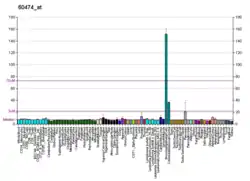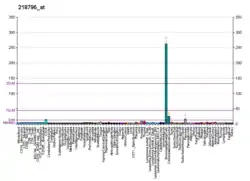FERMT1
Fermitin family homolog 1 is a protein that in humans is encoded by the FERMT1 gene.[5][6][7]
References
- GRCh38: Ensembl release 89: ENSG00000101311 - Ensembl, May 2017
- GRCm38: Ensembl release 89: ENSMUSG00000027356 - Ensembl, May 2017
- "Human PubMed Reference:". National Center for Biotechnology Information, U.S. National Library of Medicine.
- "Mouse PubMed Reference:". National Center for Biotechnology Information, U.S. National Library of Medicine.
- Weinstein EJ, Bourner M, Head R, Zakeri H, Bauer C, Mazzarella R (Apr 2003). "URP1: a member of a novel family of PH and FERM domain-containing membrane-associated proteins is significantly over-expressed in lung and colon carcinomas". Biochim Biophys Acta. 1637 (3): 207–16. doi:10.1016/S0925-4439(03)00035-8. PMID 12697302.
- Siegel DH, Ashton GH, Penagos HG, Lee JV, Feiler HS, Wilhelmsen KC, South AP, Smith FJ, Prescott AR, Wessagowit V, Oyama N, Akiyama M, Al Aboud D, Al Aboud K, Al Githami A, Al Hawsawi K, Al Ismaily A, Al-Suwaid R, Atherton DJ, Caputo R, Fine JD, Frieden IJ, Fuchs E, Haber RM, Harada T, Kitajima Y, Mallory SB, Ogawa H, Sahin S, Shimizu H, Suga Y, Tadini G, Tsuchiya K, Wiebe CB, Wojnarowska F, Zaghloul AB, Hamada T, Mallipeddi R, Eady RA, McLean WH, McGrath JA, Epstein EH (Jun 2003). "Loss of Kindlin-1, a Human Homolog of the Caenorhabditis elegans Actin–Extracellular-Matrix Linker Protein UNC-112, Causes Kindler Syndrome". Am J Hum Genet. 73 (1): 174–87. doi:10.1086/376609. PMC 1180579. PMID 12789646.
- "Entrez Gene: C20orf42 chromosome 20 open reading frame 42".
External links
- FERMT1 Info with links in the Cell Migration Gateway
- Human FERMT1 genome location and FERMT1 gene details page in the UCSC Genome Browser.
Further reading
- White SJ, McLean WH (2005). "Kindler surprise: mutations in a novel actin-associated protein cause Kindler syndrome". J. Dermatol. Sci. 38 (3): 169–75. doi:10.1016/j.jdermsci.2004.12.026. PMID 15927810.
- Maruyama K, Sugano S (1994). "Oligo-capping: a simple method to replace the cap structure of eukaryotic mRNAs with oligoribonucleotides". Gene. 138 (1–2): 171–4. doi:10.1016/0378-1119(94)90802-8. PMID 8125298.
- Suzuki Y, Yoshitomo-Nakagawa K, Maruyama K, et al. (1997). "Construction and characterization of a full length-enriched and a 5'-end-enriched cDNA library". Gene. 200 (1–2): 149–56. doi:10.1016/S0378-1119(97)00411-3. PMID 9373149.
- Wang HY, Lin W, Dyck JA, et al. (1998). "SRPK2: A Differentially Expressed SR Protein-specific Kinase Involved in Mediating the Interaction and Localization of Pre-mRNA Splicing Factors in Mammalian Cells". J. Cell Biol. 140 (4): 737–50. doi:10.1083/jcb.140.4.737. PMC 2141757. PMID 9472028.
- Strausberg RL, Feingold EA, Grouse LH, et al. (2003). "Generation and initial analysis of more than 15,000 full-length human and mouse cDNA sequences". Proc. Natl. Acad. Sci. U.S.A. 99 (26): 16899–903. doi:10.1073/pnas.242603899. PMC 139241. PMID 12477932.
- Jobard F, Bouadjar B, Caux F, et al. (2004). "Identification of mutations in a new gene encoding a FERM family protein with a pleckstrin homology domain in Kindler syndrome". Hum. Mol. Genet. 12 (8): 925–35. doi:10.1093/hmg/ddg097. PMID 12668616.
- Kloeker S, Major MB, Calderwood DA, et al. (2004). "The Kindler syndrome protein is regulated by transforming growth factor-beta and involved in integrin-mediated adhesion". J. Biol. Chem. 279 (8): 6824–33. doi:10.1074/jbc.M307978200. PMID 14634021.
- Ota T, Suzuki Y, Nishikawa T, et al. (2004). "Complete sequencing and characterization of 21,243 full-length human cDNAs". Nat. Genet. 36 (1): 40–5. doi:10.1038/ng1285. PMID 14702039.
- Ashton GH, McLean WH, South AP, et al. (2004). "Recurrent mutations in kindlin-1, a novel keratinocyte focal contact protein, in the autosomal recessive skin fragility and photosensitivity disorder, Kindler syndrome". J. Invest. Dermatol. 122 (1): 78–83. doi:10.1046/j.0022-202X.2003.22136.x. PMID 14962093.
- Fassihi H, Wessagowit V, Jones C, et al. (2005). "Neonatal diagnosis of Kindler syndrome". J. Dermatol. Sci. 39 (3): 183–5. doi:10.1016/j.jdermsci.2005.05.007. PMID 16051467.
- Has C, Wessagowit V, Pascucci M, et al. (2006). "Molecular basis of Kindler syndrome in Italy: novel and recurrent Alu/Alu recombination, splice site, nonsense, and frameshift mutations in the KIND1 gene". J. Invest. Dermatol. 126 (8): 1776–83. doi:10.1038/sj.jid.5700339. PMID 16675959.
- Herz C, Aumailley M, Schulte C, et al. (2007). "Kindlin-1 is a phosphoprotein involved in regulation of polarity, proliferation, and motility of epidermal keratinocytes". J. Biol. Chem. 281 (47): 36082–90. doi:10.1074/jbc.M606259200. PMID 17012746.
- Sadler E, Klausegger A, Muss W, et al. (2007). "Novel KIND1 gene mutation in Kindler syndrome with severe gastrointestinal tract involvement". Archives of Dermatology. 142 (12): 1619–24. doi:10.1001/archderm.142.12.1619. PMID 17178989.
- Lai-Cheong JE, Liu L, Sethuraman G, et al. (2007). "Five new homozygous mutations in the KIND1 gene in Kindler syndrome". J. Invest. Dermatol. 127 (9): 2268–70. doi:10.1038/sj.jid.5700830. PMID 17460733.
This article is issued from Wikipedia. The text is licensed under Creative Commons - Attribution - Sharealike. Additional terms may apply for the media files.





